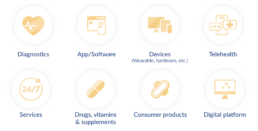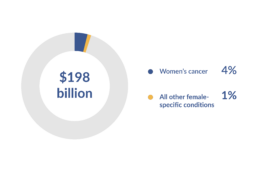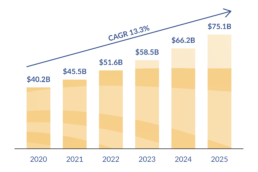The women’s health revolution
What are women's health technologies?
Women’s health technologies are products that improve healthcare for women, especially in relation to health issues where women are affected disproportionately or differently. For example, osteoporosis is four times more common in women than in men, and women often experience heart attacks differently, with symptoms such as indigestion and shortness of breath1,2.
Women’s health technology product types – adapted from FemTech Analytics Report 2021 Q4.
There are many positives to having a category of products which champions women’s health and lives in general, but we acknowledge that the term “women’s health technology” may not be all encompassing as it excludes individuals that experience women’s health issues but do not identify as women (e.g., transgender men, non-binary persons). However, the term highlights an area that needs attention, and this can facilitate cross-industry collaborations.
The women's health tech market
Biopharma clinical-phase investment in 2020. Source: McKinsey & Company
Women’s health tech market size 2020-2025, with a projected compound annual growth rate (CAGR) of 13.3%. Source: Arizton Advisory & Intelligence
Women’s health tech companies by focus area – adapted from FemTech Analytics Report 2021 Q4
The biopharma sector still reflects the undervaluing of female-specific conditions, however, the women’s health technology market overall is a newly emerging market with strong growth, addressing a wide range of product types and focus areas.
While the majority of women’s health tech companies aim their services or products towards the areas of reproductive health and pregnancy, long-neglected areas such as women’s sexual health have also started to receive attention.
Freya is addressing some of these unmet needs with its product, Lybrido.
The women's health tech market
Women’s health tech companies by focus area – adapted from FemTech Analytics Report 2021 Q4
The biopharma sector still reflects the undervaluing of female-specific conditions, however, the women’s health technology market overall is a newly emerging market with strong growth, addressing a wide range of product types and focus areas.
While the majority of women’s health tech companies aim their services or products towards the areas of reproductive health and pregnancy, long-neglected areas such as women’s sexual health have also started to receive attention.
Freya is addressing some of these unmet needs with its product, Lybrido.
Lybrido is a unique product for women's sexual health
Lybrido is aimed at improving the sexual health of women suffering from hypoactive sexual desire disorder (HSDD) or female sexual interest/arousal disorder (FSIAD). It has been developed as a tablet containing two different components, each of which are taken up by the body at different times. This two-step process is necessary for Lybrido’s effectiveness, as the effect from the first component (testosterone) is necessary for the action of the second (sildenafil).
This dual-component tablet is unique amongst sexual dysfunction treatments, and novel in pharmaceuticals in general.
Why are women's health technologies important?

Online services such as direct-to-consumer prescription services and virtual clinics offer women more options to get the support they need, in spaces that can be more comfortable and convenient. Products such as digital wearables, health trackers and home diagnostics can also provide women with more information about their health.

Women’s bodies, biology and health concerns have unfairly been considered to be stigmatized topics in many cultures. Women’s health tech businesses are opening up conversations about women and their bodies by addressing and providing support in areas such as menstrual health, sexual health, pelvic care, and menopause.

The existence of women’s health tech is a driver for scientific research into women’s health. Clinical diagnostic companies are now financing serious health concerns such as endometriosis and preterm birth. There is also an emergence of solutions tailored for specific groups such as black women, LGBTQ+ people, and women in developing countries.

A movement of women-centered design and sex and gender-specific research has sprung from the establishment of the women’s health technology industry. The majority of women’s health tech companies are owned and run by women, and in addition they often recognize and promote talented female scientists and technicians, giving them more employment opportunities.

Online services such as direct-to-consumer prescription services and virtual clinics offer women more options to get the support they need, in spaces that can be more comfortable and convenient. Products such as digital wearables, health trackers and home diagnostics can also provide women with more information about their health.

The existence of women’s health tech is a driver for scientific research into women’s health. Clinical diagnostic companies are now financing serious health concerns such as endometriosis and preterm birth. There is also an emergence of solutions tailored for specific groups such as black women, LGBTQ+ people, and women in developing countries.

Women’s bodies, biology and health concerns have unfairly been considered to be stigmatized topics in many cultures. Women’s health tech businesses are opening up conversations about women and their bodies by addressing and providing support in areas such as menstrual health, sexual health, pelvic care, and menopause.

A movement of women-centered design and sex and gender-specific research has sprung from the establishment of the women’s health technology industry. The majority of women’s health tech companies are owned and run by women, and in addition they often recognize and promote talented female scientists and technicians, giving them more employment opportunities.
References
1. Alswat KA. Gender Disparities in Osteoporosis. J Clin Med Res. 2017 May; 9(5): 382-387.
2. Johns Hopkins Medicine. Heart Disease: Differences in Men and Women
Freya Pharma Solutions B.V.
Kraanspoor 50 | 1033 SE Amsterdam | The Netherlands



